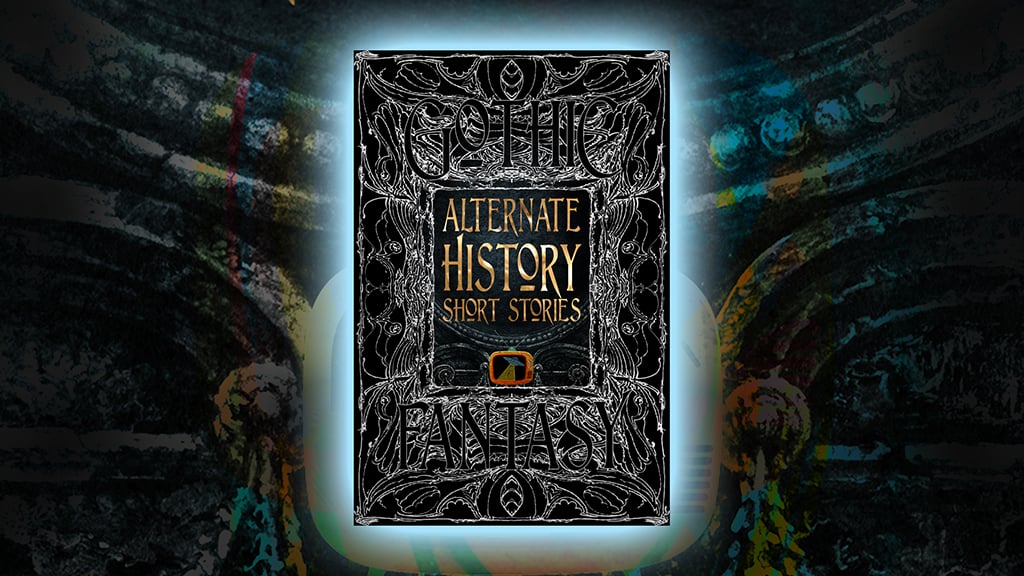Available to buy now, Alternate History Short Stories is one of our latest anthologies in our series of beautiful Gothic Fantasy hardbacks. As with the previous books, we have included new and recent fiction by modern authors alongside older, classic fiction on the theme. Exploring the fascinating ‘What If?’ question, the stories imagine and reimagine famous events and scenarios, daring to alter the course of history. In this first part of the author Q&A, writers offer details on the inspiration behind their contribution…

What was the inspiration behind your story in this anthology?
Rebecca Buchanan – The Syllabus
Most alternate histories deal with alternate human history. I started to wonder what an alternate history would look like if it dealt with another species, but I couldn’t figure out which one. Whales? Wolves? Bees? And how would I even get inside the heads of such non-human characters?
Monica Butler – The Bondage Tribe
I had written about slavery previously in my first novel, The Fall of the House of James, and subsequent novels in The James Saga, and thought it would be an interesting concept to see what would happen if this barbaric practice hadn’t been abolished in the UK. Also, I wanted to make some social points such as the class system and the way working-class people are treated to enhance the telling of the story.
Jay Caselberg – Herd Mentality
One of the pioneers of early embryology, Hans Spemann, experimented with cloning processes during the 1930s. In 1938 he proposed the ‘fantastical experiment’ of cloning a complete organism using his methods. Einstein left Germany in 1932 and never returned because of the political situation. I had started musing on what would have happened had Einstein not left, and with the Spemann labs being contemporary, I drew an inevitable conclusion. Of course Einstein’s origins might have stood in the way, but what if they hadn't?
Jonathan Davidson – The Savior of Worlds
Roger Fisher, a professor at Harvard, didn't like the idea that the President of the United States had unilateral authority to launch nuclear weapons and condemn millions to death. He once suggested implanting the nuclear codes in a volunteer. In order to launch a nuclear attack, the President would have to kill an innocent human by hand to get the codes. Fisher’s hope was that this would be an effective method of deterrence. My story explores what could have happened had the United States adopted Fisher's idea as policy shortly before the Cuban Missile Crisis.
Evan A. Davis – The Sixth-Gun Conspiracy Letters
I think it technically started at a library sale I went to and I glanced at the cover of a book called 'The Lincoln Conspiracy'. It posed a bunch of tin foil hat-type questions surrounding the assassination, but it was enough to think, “Huh, a parallel story here might be kind of fun.” Started researching it, saw room for the fiction to fit, and – Bam! – a story happened.
C.R. Hobson – Tippecanoe
I often wonder what would’ve happened if Native American tribes of the nineteenth century had successfully repelled colonial expansion. There were several pan-tribal attempts to do so, one of which was led by the Shawnee chief Tecumseh. My story tracks forward several hundred years from the Battle of Tippecanoe, where, in 1811, American soldiers dealt a fatal blow to ‘Tecumseh's Confederacy’. The story imagines a world that might've been had Tecumseh's forces carried the day.
Richard Kigel – The Untold Story of History's First Flight
Black History is American History. That is where you find true American heroes. My contribution ‘The Untold Story of History’s First Flight’ is an excerpt from my novel North on the Wind, which tells the improbable story of a Virginia slave who escaped to freedom on a homemade flying machine. It is a high-spirited adventure through the darkest corners of our American past, a celebration of ingenuity and perseverance, a triumph of the human spirit.
Andrea Kriz – The Leviathan and the Fury
Jean Moulin was General de Gaulle’s delegate in Occupied France during World War II. De Gaulle gave Moulin the mission to unite the disparate resistance movements in France into a cohesive Resistance. Shortly after accomplishing this 1943, Moulin was arrested by the Gestapo and, after brutal torture, presumably died on a train bound for Germany. I've always wanted to read an alternate history delving into how Moulin would've shaped the post-war period in France had he still been alive. I eventually decided to write it myself.
Adam Lawson – The Husband of Henry VIII
I have always been fascinated by the Tudors from a young age learning about them at school; and the more I studied them the more I found them to be arguably Britain’s most interesting and theatrical Royal Family. Henry VIII literally reinventing the Church is a point in history which I have always thought could lend itself to so much good fiction, so I opted to explore the possibility of the Devil whispering in Henry’s ear as one of his many, many other halves and forcing the issue. On another day, the story could have been Henry and Beelzebub going to war with the Church on horseback, but I think I might explore that another time…
Kwame M.A. McPherson – A Journey to the New World
As an avid reader and learner of history, I wanted to craft a tale that mapped the story of Kemet, known as today's Egypt, mixed with that of the Amazon and its lost cities, and the exploration conducted by Europeans into both areas.
Eve Morton – Where in Time and Space is Mark Twain?
I love Mark Twain, as does my husband – so much so that we spent part of our Honeymoon in Hannibal, MO where Twain grew up. I'd been reading a bunch of time-travel literature when I saw the call for this submission. My mind ran from there.
Chiamaka Muoneke – First of October
My inspiration for ‘First of October’ came from the urge to want to put out a story inspired by real events in Nigeria, as I’ve always believed that we have stories to tell. I also drew inspiration from the 2012 horror film: Abraham Lincoln: Vampire Hunter, which I believe was the first film in this genre I ever saw.
Maureen O'Leary – Earthquake Weather
When the Loma Prieta quake hit in 1989, I was at work in downtown Santa Cruz in an old brick store built on marshy landfill. Two people died in the building while I ducked under a desk and survived. None of my friends or family had a remotely similar experience during Loma Prieta: my parents lived far from the epicentre, and the university where my friends were is built on marble and limestone. When I spoke of almost dying, everyone looked through me. I wrote ‘Earthquake Weather’ about the feeling of haunting my own life in the aftermath of trauma.
Jennifer R. Povey – Regent
When I was in high school and we were studying the Tudors, I was asked “What if the sickly Arthur had survived and become King instead of his brother?” This was the first time I had actually encountered the idea of a counterfactual and the question stuck with me. For ‘Regent’, though, I decided to take it slightly more sideways and instead of asking that question, I asked “What if Arthur had fathered a son on Catherine of Aragon before his death?” ‘Regent’ is a brief attempt to explore this idea.
Matias F. Travieso-Diaz – The Last Tsar
‘The Last Tsar’ was inspired by the appalling history of modern Russia, particularly its ongoing war of aggression against Ukraine. I was aware that, in the second half of the nineteenth century, there was a Tsar – Alexander II – who was a moderate reformist, but his rule was cut short by his assassination in 1881. My story addressed the question: What would have been the subsequent development of Russia as a nation had Alexander II continued to implement his reform programme?
Rebecca E. Treasure – I Will Not Be
This story was originally commissioned for the Air & Nothingness Press anthology Future Perfect in Past Tense, which featured 3 time-travel stories going forward in time and three travelling into the past. As a historian and a lover of history, the choice of writing about the past was easy for me. I have always been fascinated by the Pre-Columbian cultures and civilisations that spanned the continents on this side of the Atlantic ocean. Humanity lost so much in the devastation of those peoples and histories and cultures by disease and the evils of colonialism. In the end, I imagined a future where love drove someone to rewrite history on behalf of their lover and save the past at the cost of the future.
DJ Tyrer – Opening England
‘Opening England’ was inspired by an idea I had for an alternative timeline in which England took the place of Japan as the island nation that closed itself off from the world and was, eventually, forcibly opened to trade (which event is covered by this tale). Japan, like England, was closely linked to the mainland and produced a wide-ranging nautical culture with piratical inclinations, so the potential for England to follow a similar path is not quite as far-fetched as it might seem at first glance.
Iris Whelan – Mary, Quite Contrary
I started this story during the pandemic after a trip down the google rabbit hole led me to George Soper’s contemporary account of Typhoid Mary. I was struck by the public health official’s hardly veiled contempt for her and felt for her despite the very real threat she posed. In some ways her attitude mirrored resistance to common-sense covid interventions, which was frustrating me at the time, so the story was an attempt to reconcile that.
Cameron Wise-Maas – Men of Their Time
Reading A People's History of the United States made me realise how many still-celebrated historical figures would have been villains if they weren't part of an origin narrative. Most Axis-victory alternate history – among the most popular settings in the genre – visualise a dystopia, but I think the greater horror is that, for many conflicts, we already live in the world won by the villains. If Hitler had succeeded, I think the Holocaust would have been remembered in the same way the genocide of the Taíno in Columbian Hispaniola is – which is to say, whitewashed if it's remembered at all.
Alex Woodroe – Carrots for Nine
My country’s history of dictatorship was a major source of inspiration for this story. It’s a living and very recent history for us, so I get to hear the songs and see the plays and talk to people about the interminable overnight queues for food, the fight to survive, and how everyone – and I mean everyone – turned to smuggling. Food, vitamins, contraceptives, people. There’s more to say than one story can cover, but it feels good to make a start.
James Young – Winifred
‘Winifred’ is the origin story for my Usurper's War Universe. The entire POD was based on finding a point in WW2 where killing Adolf Hitler actually makes a difference vs. just increasing the death toll. I'd already referenced it ‘off screen’ and decided to finally put nebulous thought to firm paper. I hope the readers enjoy it!
Elizabeth Zuckerman – Butterfly Burning
Emma Livry has haunted my imagination for about twenty years. I'd kept her in the back of my mind in the ‘someday I will write about this’ box, but never found the right way into her story. Then I took a fiction workshop that started off with The Firebird, and suddenly I had the key. Borrowing from the fairytale gave me both a viewpoint character and a way to rescue her, if only I could convince her to take it.




